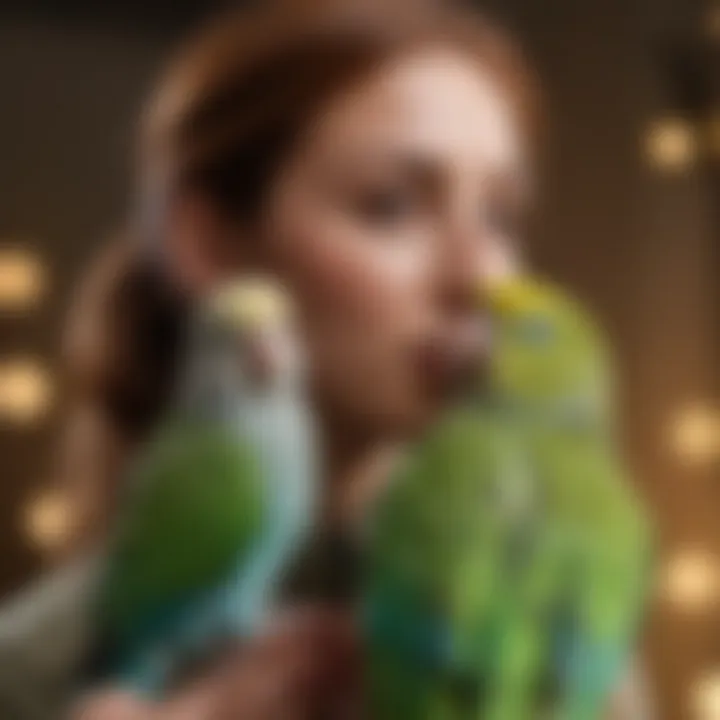The Role of Pet Birds in Enhancing Mental Health


Intro
The relationship between pet birds and mental health is an intricate and compelling area of study. Many pet bird owners experience first-hand how these feathered companions can create a positive impact on mental well-being, particularly in alleviating symptoms of depression. While anecdotal evidence suggests their influence, scientific research also hints at the multifaceted benefits these pets offer. This article examines this synergy between avian companionship and mental health, discussing real-life experiences alongside empirical studies.
Through a thorough investigation, we will analyze various aspects such as daily care practices, behavioral insights, nutrition, wellness checkups, and engaging activities that can enhance both the life of the pet and the owner. The narrative aims to unfold the therapeutic qualities of pet birds and provide pet bird owners, aspiring bird parents, and breeders with actionable insights on how to foster a mutually beneficial relationship. This understanding can significantly contribute to enhancing mental health and well-being.
Each section will delve into the nuances of caring for pet birds, aligning their needs with the mental health benefits they can provide. Understanding this relationship is crucial for anyone considering bird ownership or looking to deepen their bond with their avian friends.
Foreword to Pet Birds and Mental Health
The topic of pet birds and their impact on mental health is increasingly relevant in the realm of modern human experience. As society grapples with rising mental health issues, the potential benefits of companion animals are gaining recognition. Pet birds, with their unique characteristics and companionship abilities, can offer support that may influence psychological well-being. Here, we focus on the specific elements that make pet birds meaningful companions and how they can play a significant role in alleviating symptoms of depression.
Understanding Depression in Modern Society
Depression remains a significant public health concern, affecting millions worldwide. Its prevalence underscores the need for effective coping strategies. Many individuals find themselves navigating a complex landscape of responsibilities, relationships, and expectations, leading to feelings of isolation or sadness. Depression can manifest not just in emotions but also through physical symptoms. An understanding of depression requires recognizing these diverse aspects. With many seeking alternatives to traditional therapies, pet birds emerge as an interesting avenue worth exploring. Companionship provided by these feathery creatures can potentially mitigate feelings associated with this pervasive disorder. The presence of a pet can create routines and offer comfort that gently counteracts depressive symptoms, supporting the notion that animals truly enhance human life.
The Rise of Companion Animals
In recent years, the role of companion animals in our lives has expanded significantly. This trend reflects a growing acknowledgment of their positive contributions to mental and emotional health. Many pet owners report substantial improvements in their mood, social engagement, and overall satisfaction with life after welcoming birds into their households. Unlike many other pets, birds can engage in vocal interactions and have a tendency to mimic sounds, creating a lively atmosphere. These interactions can serve as a distraction from negative thoughts and feelings. Moreover, peer-reviewed research recognizes the therapeutic attributes of having pets, emphasizing their capacity to alleviate stress and promote happiness.
The rise of companion animals has encouraged deeper inquiries into not only the benefits of having pets but also the specific advantages of keeping pet birds. Thus, understanding the connection between pet birds and mental health becomes a crucial part of recognizing their potential as effective companions for those dealing with depression.
The Connection Between Pets and Psychological Well-Being
The relationship between pets and human psychological well-being has gained significant attention in recent years. Numerous studies have highlighted the positive effects pets can have on mental health, especially during challenging times. Pet birds, often overlooked in the broader conversation about companion animals, represent a unique category that offers their own set of benefits. Their ability to provide companionship and emotional support is crucial for individuals dealing with various mental health issues, including depression.
Having a pet bird can create a sense of connection that many people may lack in their daily lives. The act of caring for another living being can instill purpose and responsibility, which fosters a stable routine. Integrating pet birds into one’s life can bring joy and moments of lightness, making daily challenges feel more manageable. The simple presence of these creatures can alleviate feelings of loneliness or isolation, which are common symptoms for those suffering from depression.
Emotional Support from Animal Companionship
Emotional support animals have long been recognized for their therapeutic benefits. Pet birds, despite their small size, can play a substantial role in providing emotional support. These birds often display unique personalities, exhibiting behaviors that can be both entertaining and soothing. For example, some bird species are known for their ability to mimic human speech. This auditory interaction can enhance feelings of companionship, especially for individuals who may be homebound or socially withdrawn.
Moreover, the tactile experience of interacting with a bird—gently stroking their feathers or watching them hop and play—can produce calming effects. Engaging with a bird allows individuals to focus on their needs, diverting attention from their worries. Many bird owners report feeling happier and more engaged with life due to their bond with their birds.
- Bonding activities, such as teaching a bird new words or tricks, can elevate mood and encourage positive thinking.
- Birds provide non-judgmental companionship, which can reduce feelings of anxiety.
Research Studies on Pets and Depression
The academic community has invested effort in understanding how animal companionship influences emotional well-being. Several studies confirm that interaction with pets, including birds, can lead to decreased levels of depression and anxiety. One study published in the journal "Anthrozoös" noted that pet ownership correlates with lower levels of stress. Interestingly, the study also found that the mere presence of a companion animal can lead to physiological changes, including lower blood pressure and heart rate.
Another significant study highlighted that individuals with pets often report higher self-esteem and general well-being. Participants indicated that their relationships with their animals provided consistent emotional support. This reinforces the notion that pet birds, too, can be pivotal in alleviating symptoms of depression.
Regular interaction with a pet, regardless of its species, can lead to improved mental health outcomes, making birds an often underappreciated ally in the fight against depression.
Unique Qualities of Pet Birds
Pet birds offer distinct qualities that set them apart from other companion animals. Their unique characteristics influence the potential mental health benefits they provide. Understanding these qualities helps to appreciate how they can alleviate feelings of depression and loneliness among pet owners.
Social Interaction and Bonding
Birds have an innate ability to form strong bonds with their owners. This social interaction can be incredibly beneficial for individuals dealing with mental health challenges. Parrots, for example, are known for their intelligence and ability to mimic human speech. This capability fosters deeper communication, which can help to alleviate feelings of isolation. A simple interaction, like talking to a bird or playing with them, provides daily moments of connection.
Many bird owners report feelings of joy derived from observing their pet's behaviors. Engaging with a bird creates a sense of purpose. When a pet bird is included in daily routines, this provides structure and motivation. Taking care of a bird often results in positive reinforcement through their reactions. This bond can serve as an emotional anchor for individuals navigating through depressive episodes.
Additionally, birds can become a part of social circles. Owners often connect through shared interests, which promotes a community of bird lovers. Participating in forums like reddit's bird communities develops a sense of belonging. The interactions can lead to friendships that might help in improving mental health.


The Therapeutic Sounds of Birds
The sounds produced by pet birds can have soothing qualities. Many people find the gentle chirping and singing of birds to provide comfort. This auditory stimulation can be especially significant for those battling mental health issues. The acts of listening to bird calls or melodies can act as a form of therapy.
Research indicates that natural sounds help to reduce stress levels. Bird songs can enhance mood and positivity. Listening to their melodies can result in a relaxation response, contributing to an improved mental state. For those feeling overwhelmed or anxious, the calming presence of a pet bird can create a serene environment.
Establishing a peaceful area in the home dedicated to the bird can lead to moments of mindfulness. Spending time focused on the sounds of birds encourages individuals to be present in the moment. This meditative quality is important for mental wellness and can counter depressive thoughts.
"Birdsong can enhance human mood and foster feelings of tranquility."
In summary, the unique social qualities and therapeutic sounds of pet birds create a supportive atmosphere for mental health improvement. Their presence in a person’s life can help alleviate the burdens of depression, providing companionship that many individuals need.
Practical Benefits of Keeping Pet Birds
Keeping pet birds offers several practical benefits that extend beyond companionship. These benefits can play a significant role in the mental well-being of individuals suffering from depression. By engaging with birds, owners often find a daily structure, foster physical activity, and cultivate a sense of responsibility. All these elements may contribute positively to mental health and emotional stability.
Daily Routine and Structure
Having a pet bird necessitates establishing a daily routine. Birds require specific care, including feeding, cleaning, and social interaction. This structure brings predictability into the owner’s life, which can be particularly beneficial for those dealing with depression or anxiety. A consistent schedule can improve mood by instilling a sense of purpose.
Additionally, this routine may encourage the owner to break tasks into manageable parts. For example, setting aside time for bird-related activities helps build a sense of achievement when those tasks are completed.
- Feeding: Regular feeding times can stabilize energy levels, which is essential for mental clarity.
- Cleaning: This too is a routine activity that promotes a clean living space, enhancing overall well-being.
- Social interaction: Regular engagement with the bird can lead to increased emotional connection.
Encouragement of Physical Activity
Keeping pet birds can motivate owners to be more physically active. Bird owners often need to engage in various forms of physical activities that can significantly improve overall health.
One common activity is exercising with the birds, which many owners do by allowing their birds to fly or move around in a designated safe space. This promotes activity not just for the bird but also for the owner, who must remain engaged.
Regular interactions can include:
- Playtime: Using toys to encourage movement.
- Flight exercises: Facilitating safe flying environments for their birds.
- Cleaning and maintenance: Regular tasks that involve moving around can also count as physical activity.
These activities can help reduce feelings of lethargy, which is often associated with depression. Moreover, the very act of taking care of another living being can serve as a motivator to remain active during low periods.
In summary, the practical benefits of keeping pet birds can significantly contribute to mental health improvement, providing essential structure and encouraging physical activity.
Considering these advantages can aid current and potential bird owners in understanding how their pets' care demands may help in bettering their own mental states.
Challenges of Owning a Pet Bird
Owning a pet bird may seem like a rewarding experience. However, it comes with its challenges that potential bird owners must consider. The decision to welcome a feathered companion into one’s home is not solely based on the benefits they can provide for mental health. Understanding the challenges involved is crucial for ensuring both the owner and the bird thrive together.
Species-Specific Considerations
Different bird species have unique needs and characteristics. For example, larger birds like African Grey Parrots require more mental stimulation and social interaction than smaller species such as budgies. A key consideration when choosing a pet bird is understanding its specific needs for housing, diet, and social engagement.
- Social Species: Parrots and cockatoos are highly social and may suffer from loneliness, leading to behavioral issues if not properly engaged.
- Quiet Birds: Species like canaries are low-maintenance and quieter, which may suit some households better.
- Lifespan: Some birds, like macaws, can live up to 60 years or more, requiring a long-term commitment from the owner.
These factors highlight that selecting a species aligns not only with personal preferences but also with one’s lifestyle, available time, and ability to provide care.
Time Commitment and Care Needs
Caring for a pet bird involves a significant time investment. This can be particularly daunting for busy individuals. Birds need daily attention, including feeding, cleaning, and social interaction to remain healthy and happy. Here are some essential care needs:
- Daily Interaction: Birds require social activities and interaction with their owners to maintain emotional health.
- Balanced Diet: Proper nutrition, including fresh fruits, vegetables, and specialized pellets, is vital for preventing health issues.
- Environment Maintenance: Regular cleaning of cages and living spaces is necessary to ensure hygiene and prevent diseases.
- Veterinary Checkups: Routine visits to an avian veterinarian help monitor health and catch any potential issues early.


These commitments can be substantial depending on the species. It is essential to fully understand what is required before making the commitment to own a bird.
Potential bird owners must weigh the joyous companionship against the responsibilities inherent in bird care. Neglecting these needs can adversely impact both mental health gains and the bird's well-being.
In summary, while pet birds can play a part in improving mental health, potential owners must be aware of the challenges involved. This awareness plays a critical role in ensuring the mutual well-being of both the bird and its owner.
Anecdotal Evidence: Personal Experiences
Anecdotal evidence plays a significant role in understanding how pet birds can affect mental health, particularly in alleviating symptoms of depression. Personal stories shared by bird owners provide insights that statistical data may overlook. They illustrate real-life experiences, showing how individuals connect emotionally with their birds, and the companionship they offer. These narratives can support the findings of scientific studies and add depth to the understanding of animal-assisted therapy.
Testimonies from Bird Owners
Many bird owners express a profound bond with their companions. These relationships manifest in various ways, from simple daily routines to complex interactions that provide comfort and joy. For instance, a parakeet's sweet song can brighten a gloomy day, offering a sense of companionship that many people find invaluable.
Common themes emerge from these testimonies, such as the following:
- Birds provide emotional stability during challenging times.
- Their playful antics can elicit laughter, helping to combat feelings of sadness.
- Some owners report that caring for a bird gives them a purpose, thereby reducing feelings of worthlessness or hopelessness.
The importance of these personal narratives cannot be understated. They show how birds become not only pets but also critical support systems, enriching the lives of their owners in ways that are sometimes difficult to quantify.
Community Impact and Support Systems
Communities around pet birds foster strong support networks among their members. Enthusiastic discussions on platforms like Reddit and Facebook help individuals share experiences, tips, and emotional support. These communities serve as safe spaces for bird owners to express their challenges and triumphs.
Key aspects of community support include:
- Knowledge Sharing: Owners exchange information about bird behavior and care practices, leading to enhanced understanding and improved health for their birds.
- Emotional Connections: People often bond over shared experiences, creating friendships that can help alleviate feelings of isolation.
- Support in Crisis: During particularly difficult times, online and local communities provide emotional comfort and practical advice, reinforcing the sense of belonging among bird owners.
The collective voice of these communities reinforces the positive impact of pet birds on mental health. Bird ownership becomes not just an individual experience but part of a broader supportive network that can promote mental well-being.
"Having a bird isn't just about the companionship; it's about being part of a community that understands your love for these creatures."
Through these personal stories and community dynamics, the anecdotal evidence underscores the valuable role of pet birds in mental health. Their influence goes beyond mere companionship; it influences the emotional landscape of many individuals.
Scientific Insights into Animal-Assisted Therapy
The field of animal-assisted therapy has gained recognition over the years for its potential to improve the lives of people facing various challenges, including mental health issues like depression. Understanding how pet birds, specifically, can foster such improvements is essential for appreciating their role as companions. This section discusses the scientific mechanisms through which avian companions contribute to mental wellness and examines specific case studies that highlight their effectiveness.
Mechanisms of Action
Pet birds can positively impact mental health through various psychological and physiological mechanisms. First, their presence can stimulate significant emotional responses in humans. Interaction with birds, such as talking or playing, can trigger the release of oxytocin, often dubbed the ‘love hormone,’ which may help reduce stress and enhance feelings of belonging. This bonding experience can play a crucial role in alleviating depressive symptoms.
Second, pet birds encourage mindfulness and engagement with the environment. Observing their behaviors, routines, and vocalizations can help keep the owner present, redirecting attention away from negative thoughts. This engagement promotes a sense of peace and distraction from troubling thoughts, a vital component in managing depression.
Moreover, the care and responsibility involved in bird ownership necessitate daily routines. Such structure can create a sense of purpose, particularly beneficial for individuals struggling with motivation inherent in depressive states. Responsibilities of caring for birds, like feeding, cleaning, and maintaining their habitats, form a foundation that can carry over into other areas of life, fostering a sense of accomplishment and routine.
Case Studies Involving Birds
Several case studies illustrate the positive impact that birds can have on mental health. For instance, a study published in the Journal of Psychiatric Research examined patients with major depressive disorders who were introduced to pet birds during their treatment. Results showed that these individuals reported significant decreases in their depressive symptoms after several weeks, attributing part of their progress to the emotional connections developed with their avian companions.
Another notable case involved a therapy program utilizing birds in a community setting. Participants engaged in structured activities revolving around caring for and interacting with pet canaries. This initiative not only improved morale but also provided participants with a supportive network. Feedback indicated that many felt less isolated due to shared experiences with both the birds and fellow participants.
"The therapeutic role of animals, particularly birds, extends beyond companionship; it encapsulates a deep well-being enhancement aspect that deserves attention in the realm of mental health treatment."
By illustrating the mechanisms at play and presenting real-world evidence of effectiveness, the case for considering pet birds as vital allies in mental health management gains substantial foundation.


Bird Care and Its Impact on Mental State
Caring for pet birds is not just about providing food and shelter; it involves understanding their needs and behavior deeply. This bond can have profound effects on the mental states of both the owner and the bird. When owners engage in bird care, it establishes a routine that can offer structure to their daily lives, which is often beneficial in managing symptoms of depression.
Birds require a specific environment and regular interaction. This need for care can foster a sense of responsibility in the owner. When individuals see that they can provide a nurturing environment, it can improve self-esteem and contribute to a positive mental state. The act of caring for a pet bird also creates opportunities for interaction, which is crucial for emotional health. Regular engagement can help alleviate feelings of loneliness.
Moreover, pet birds have unique ways of expressing themselves. Understanding these behaviors improves owner-bird interaction, leading to a more profound bond. This connection can be a vital source of emotional support. Therefore, it is essential for bird owners to learn about their pet's behavior and body language.
"Engagement in daily bird care can not only benefit the bird but also significantly uplift the caregivers' mental health."
Understanding Bird Behavior and Body Language
Understanding bird behavior and body language can lead to a better quality of life for both parties. Birds communicate their feelings through various vocalizations and body movements. Recognizing signs of happiness, such as chirping and playful movements, reinforces positive interactions. Conversely, identifying stress signals, like feather plucking or aggressive behaviors, is crucial. This awareness helps in addressing the bird's needs promptly.
Birds also demonstrate affection in various ways. Head bobbing and wing flapping are common displays of happiness. When owners respond positively to these cues, they strengthen the bond, fostering a sense of companionship. Additionally, knowledge of bird behavior encourages patience and understanding. This can be particularly beneficial during tough times, where caring for a pet can serve as both distraction and comfort.
Creating a Positive Environment for Birds
Creating a positive environment for pet birds is fundamental for their well-being. A stimulating environment reduces stress and keeps birds mentally engaged. This can include various toys, perches of different textures, and safe spaces for exploration. Moreover, birds thrive in social settings. Interaction with their owners and exposure to different environments can promote a sense of security.
It is also important to maintain good hygiene in the bird's living space. A clean environment prevents illnesses, which contributes to overall well-being. Regular cleaning and changing of food and water can make a significant difference in a bird's health. Healthy birds are more likely to exhibit playful behaviors, which can brighten the atmosphere in the household.
Future Research Directions
Future research in the area of pet birds and mental health is crucial for a comprehensive understanding of their impact on psychological well-being. This segment will discuss the anticipated developments regarding studies focused on avian companions and how they affect depression.
Emerging Studies on Birds and Mental Health
New research is commencing to investigate the precise role of pet birds in mitigating symptoms of depression. One area of interest includes the effects of specific species on their owners' mental states. Research can analyze which birds elevate mood most effectively or which species engage their owners in social interactions. Advances in this field can contribute to tailored therapeutic approaches involving avian pets. Furthermore, studies could explore different environments and their influence on both birds and humans. For instance, research can investigate whether pet birds thrive better in urban or rural settings and how these circumstances can relate to the mental wellness of their owners.
Across the globe, universities and psychological institutions are beginning to recognize the need for systematic research in this area. Collaborations between ornithologists, psychologists, and veterinarians can shed light on the science behind the emotional benefits of having pet birds. Such studies could lead to advancements in animal-assisted therapy approaches, particularly for individuals struggling with depression.
Cross-Species Comparison in Therapy
The idea of comparing the therapeutic effects of various types of pets can provide valuable insights. By juxtaposing the effects of birds with those of cats or dogs, researchers can unearth unique benefits and challenges associated with avian companionship. For example, the different social behavior patterns of birds may influence their interaction dynamics with humans, leading to distinct emotional outcomes.
Additionally, cross-species research can also draw attention to the mood-enhancing characteristics that only certain species possess. Understanding how birds differ from other common pets in providing emotional support can help formulate effective treatment plans and raise awareness about the unique attributes of pet birds.
In summary, the exploration of future research directions is essential for extending the domain of pet birds and their impact on mental health. By encouraging comprehensive studies, stakeholders can better grasp the multifaceted relationship between avian companions and mental wellness. This ever-evolving research can significantly enhance societal understanding, which may in turn foster a more profound appreciation for the role that pet birds play in alleviating depression.
Finale: Weighing the Benefits and Considerations
The conclusion serves a critical role in summarizing the vital points discussed throughout this article. It highlights how pet birds can have a significant impact on mental health, particularly in alleviating symptoms of depression. Understanding both the benefits and the challenges associated with bird ownership allows for a more informed decision-making process for potential pet owners.
Summary of Observations
Throughout this article, various aspects of the relationship between pet birds and mental health have been explored. Pet birds can provide emotional support and companionship, essential for those battling depression. They help establish routines, encourage social interactions, and offer therapeutic benefits through their presence and behaviors. Research studies have shown a connection between pet ownership and improved mental states. However, challenges such as specific care needs and the commitment required to keep these animals healthy and happy cannot be overlooked.
Key observations include:
- Emotional Benefits: The comfort of having a bird can contribute to a more stable emotional environment.
- Social Engagement: Birds encourage interaction, both with the pets and with others.
- Physical Activity: Caring for birds can promote healthier lifestyles.
- Awareness of Challenges: Potential owners must also be aware of the time and care needed for different species.
Final Thoughts on Bird Companionship and Mental Health
Bird companionship offers enriching experiences that are often overlooked in pet ownership discussions. The joy of having an avian friend may not only brighten one's home but also provide a unique therapeutic outlet. While the benefits are significant, it is imperative to acknowledge the responsibilities that come with owning a pet bird.
Birds, with their vibrant personalities and vocalizations, can uplift moods and enhance social interactions. As more research unfolds, the understanding of their role in mental health continues to evolve. Therefore, for those considering a pet to combat feelings of depression, a pet bird may be a valid and rewarding choice, but preparation and understanding are crucial.
"The presence of pet birds in a home can transform not just the owner's mental health, but also greatly enrich the overall atmosphere of the environment."
In summary, the benefits of pet birds can make a positive contribution to mental wellness. However, it is necessary to weigh these against the considerations of commitment and care. Ultimately, the journey with a pet bird requires intention and dedication, leading to fulfilling companionship and improved well-being.















